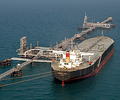Russian-Owned NIS Stops Getting Oil Cargoes Amid Serbian Fuel Crisis, Sources Say

The source, who asked not to be named due to the sensitivity of the situation, told Reuters that Serbia had only days before the NIS oil refinery in Pancevo was forced to stop processing crude.
NIS did not respond to a Reuters request for comment.
Serbian President Aleksandar Vucic warned on October 9 that without deliveries, the refinery, which supplies most of the country’s oil products, including gasoline and jet fuel, would struggle to operate after November 1.
However, Vucic said that fuel storage was full and existing stocks of oil products would maintain Serbia’s supplies until the end of the year. “There will be no shortage of crude oil, its derivative products, and no energy crisis,” he told Serbia last week.
Russia and Serbia are still working to find a solution that would lift US sanctions, announced in January to target Russia’s majority ownership of the NIS, which went into effect on October 9 after the latest leniency expired.
Vucic is facing a wave of anti-government demonstrations and may now have to try to secure additional emergency oil barges as winter weather hits the Balkan country.
US SANCTIONS INTERFERE WITH CARGO
The tanker Maran Helios carrying 1 million barrels of KEBCO Kazakh crude oil bound for NIS in Serbia arrived in Croatia’s Omisalj on October 9, according to data from analysis group Kpler.
But the fuel did not reach Serbia, sources close to the matter said.
Croatian pipeline operator Janaf (JANF.ZA), opens new tab, which has been granted an extension to continue transporting oil to Serbia until October 15, said in a statement this week that it had delivered all systems owned by NIS by October 8.
Janaf said it had no more oil to send to Serbia after that date, indicating that it had not yet received a receipt for the KEBCO Kazakh crude oil cargo that had been purchased by NIS.
Reuters could not determine whether the cargo would be stored in Omisalj or resold to another buyer, after it was finally unloaded on Tuesday after being stranded at the port for about two weeks, Kpler data showed.
SERBIA IS FACING A FUEL SHORTAGE
The crude the NIS should receive will be enough to run the Pancevo refinery for about 10 days, according to Reuters calculations.
Although two sources told Reuters that Serbia’s fuel stocks were almost full, the country would become increasingly dependent on imports as supplies run low.
“For me, it’s not out of the question. Refineries must function, and gas stations must remain operational,” Nadezda Kokotovic, former head of the NIS’s liaison office in the European Union, told Reuters.
Source: Reuters
